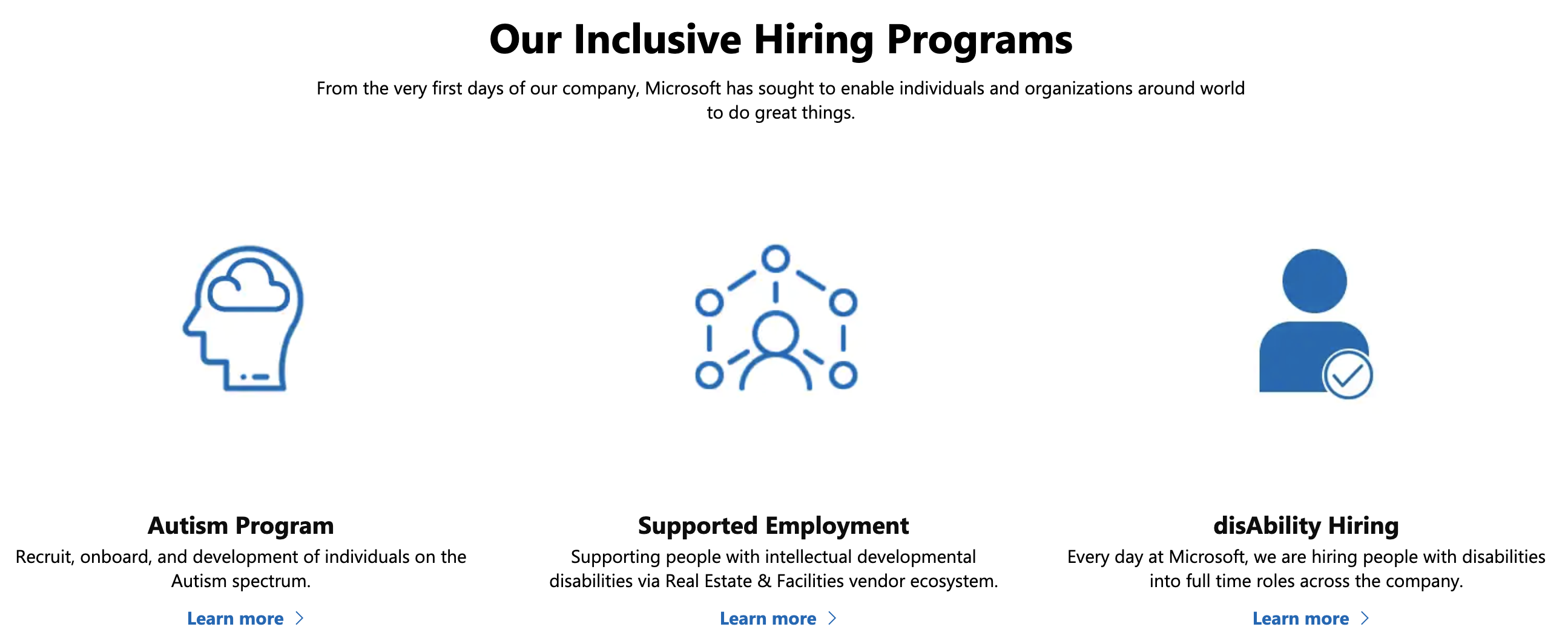Microsoft, SAP, Deloitte, JPMorgan Chase, and Ernst & Young. What do all these companies have in common?
Not only are they successful, multinational enterprises, but they all have initiatives to hire neurodiverse talent.
What is neurodiversity?
Neurodiversity is the idea that neurological differences in humans are normal variation and those with them should be respected as much as those without them.
Neurodivergent talent can include, but is not limited to, people with the following neurological differences:
-
-
- Dyslexia
- Attention Deficit Hyperactivity Disorder (ADHD)
- Autism Spectrum Disorder (ASD), also called Autism Spectrum Condition
- Tourette Syndrome
- Down’s Syndrome
- Dyscalculia
- Dyspraxia
-
People with neurological differences live with many stigmas, including the stigma that they cannot perform in the workplace to the same standards as neurotypical people. In the last decade, we’ve seen companies prioritize diversity in the workplace, neurodiversity-specific initiatives included.
Neurodivergent individuals add to the fabric of a company while bringing their unique perspectives and skills. For example, people with dyslexia can have acute visual thinking and spatial reasoning skills. Also, some people on the autism spectrum possess phenomenal concentration and memorization.
Building a neurodiverse workplace
Neurodiversity is currently receiving unprecedented attention from businesses. Companies are realizing the value in an openly neurodiverse workforce; however, there are few resources available about how to create a robust recruiting program for neurodivergent talent.
Recruiting neurodivergent employees
Many companies have created specific programs and channels for neurodivergent applicants to indicate their interest in a position. For example, Microsoft has additional programs for those with intellectual or physical disabilities.
 Courtesy of Microsoft
Courtesy of Microsoft
Providing special channels for neurodivergent recruitment can highlight talent that might otherwise go unnoticed; this also shows the dedication the company has to a neurodiverse workforce.
Businesses can modify their interview process to consider neurodivergent needs. Many interview norms are uncomfortable for neurodivergent people, triggering behaviors that might diminish their other skills and qualifications. For example, panel interviews can be overwhelming for some with Autism Spectrum Disorder because it forces them to evaluate nonverbal and verbal communication of multiple people at once. Instead, sequential interviews allow multiple people to interview an applicant on the spectrum without overloading them.
Vous voulez en savoir plus sur Logiciel d'accessibilité pour sites web ? Découvrez les produits Accessibilité du site web.
Supporting neurodivergent employees
While we’re seeing more businesses prioritize neurodiverse recruiting than ever before, just recruiting neurodivergent individuals isn’t enough. Businesses can make adjustments to the job or work environments to accommodate people with neurodivergent differences.
Managers can accommodate by being flexible about accommodations for neurodivergent employees. For example, if a neurodivergent employee is sensitive to harsh light, businesses can set aside designated huddle rooms as low light workspaces. Additionally, individuals with sensitivities to noise levels might require a private work area instead of an open office floor plan.
Neurodiversity is still a new concept to many. There are plenty of misconceptions and stigmas surrounding neurodivergence that must be considered to create a comfortable workplace for neurodivergent people.
Hosting workshops or inviting speakers to facilitate discussion about neurodiversity to your company is one consideration. Ideally, these workshops would be hosted by neurodivergent individuals that could use their expertise and knowledge in discussion.
Software for recruiting and supporting neurodivergent talent
Companies that want to hire diverse candidates can typically lean on diversity recruiting software. While these tools are great at targeting diverse candidates in terms of race and gender, they typically don’t consider neurodiversity.
Courtney Moran, G2’s dedicated research analyst for the HR software market, notes there is plenty of room for software providers to build tools that specifically support neurodivergent employees.
| “As companies like SAP, Microsoft, and Ford reevaluate their hiring processes to create and expand their neurodiverse talent pools, we can expect to see substantial innovation across recruitment and management technologies. Software aimed at diversity recruiting, candidate assessment, interviewing, onboarding, training, and career pathing, to name a few, will have to expand to meet the needs of this largely untapped talent pool.” |
This is a huge opportunity for diversity recruiting tools to differentiate themselves in the market and get ahead of the game in an emerging area of interest.
Otherwise, neurodivergent individuals might need to leverage website accessibility software to accommodate their needs. For instance, there are software tools to support people with dyslexia by reading text from a webpage out loud. However, this isn’t always the case and many neurodivergent people don’t require specific accessibility tools to support computer usage.
Unseen neurodiversity
Businesses are considering neurodiversity now more than ever. While their motives are well-intentioned, companies must not make assumptions about what neurodivergence can look like.
The neurodiverse community is very diverse. Many neurodivergent people don’t have obvious behaviors that would indicate to others that they aren’t neurotypical. It’s likely that businesses already have neurodivergent employees that are either undiagnosed or haven’t disclosed it to their employers out of fear of discrimination.
Companies can still be supportive and inclusive of hidden neurodivergent coworkers by considering neurodivergent needs whether or not they have known neurodivergent employees. Businesses can create awareness around neurodiversity and building processes with neurodivergent needs as a standard to normalize accomodation for neurodivergent people.

Jazmine Betz
Jazmine is a former senior market research analyst at G2. In her free time, she's playing video games or watching Lord of the Rings for the hundredth time.
